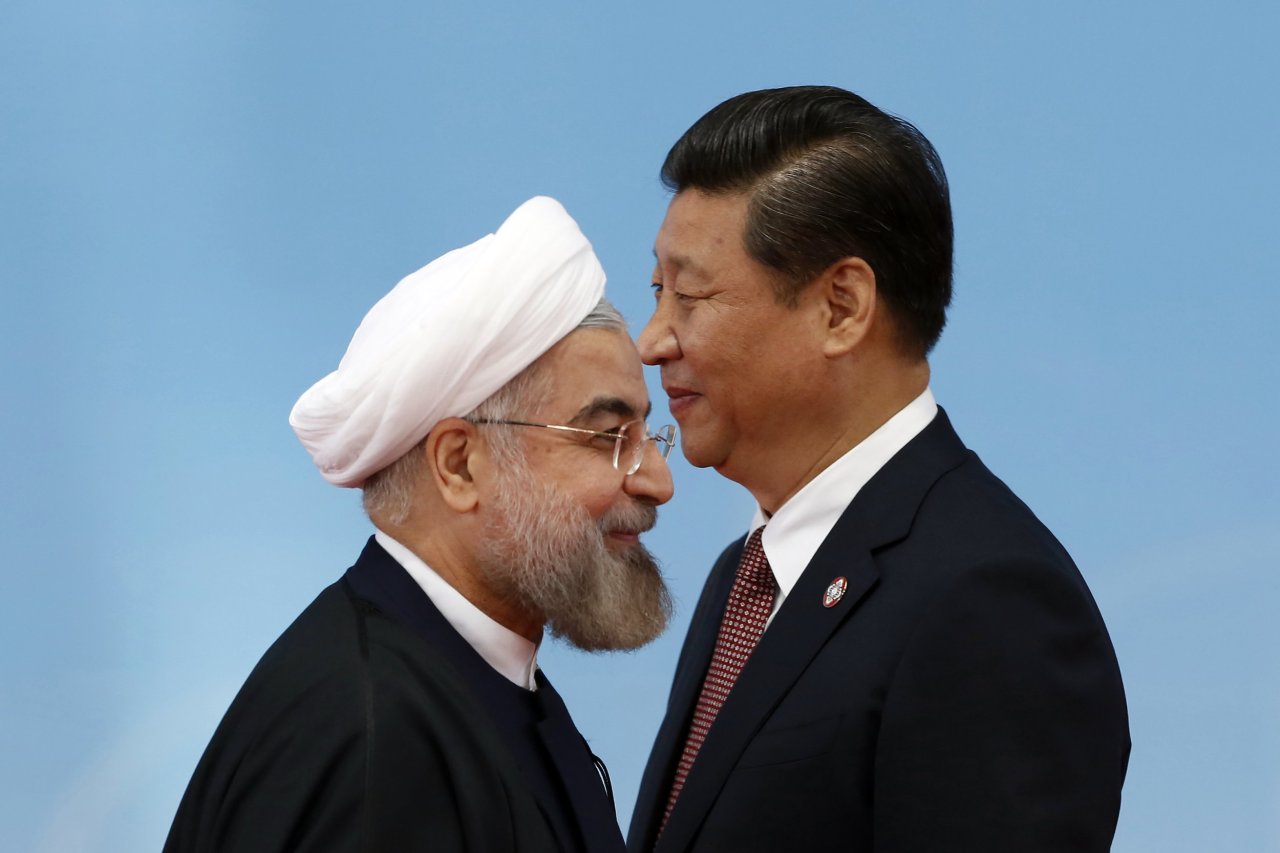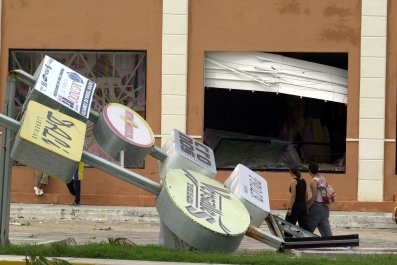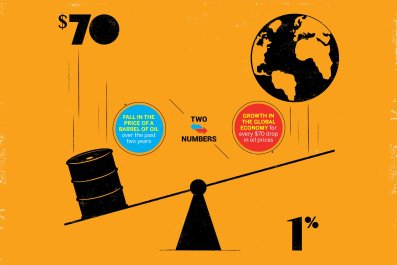As Iran celebrates the lifting of sanctions and cranks up its oil production, the biggest winner may be China, Iran's new best friend. Chinese President Xi Jinping paid a visit to Tehran in January, meeting Iranian President Hassan Rouhani and signing a 25-year economic, political and military cooperation pact. The two leaders announced the signing of 17 deals—including agreements on oil drilling, nuclear energy and a vast infrastructure project linking China to the Mediterranean, known as One Belt, One Road. Rouhani predicted the deals would boost bilateral trade tenfold to an annual $600 billion in the next decade.
"The end of the sanctions will serve first and foremost to help Chinese energy firms—that is why President Xi Jinping is paying a sudden official visit to Tehran," says Jean-Christophe Iseux, Baron von Pfetten, a French senior adviser to the Chinese government. (He convened a series of back-channel meetings among top Iranian, Chinese and Israeli officials in the run-up to July's grand deal in Vienna, where Iran agreed to suspend its nuclear program in exchange for the lifting of sanctions.) "The [nuclear] deal would not have been possible without the active involvement of Iran's sole trusted foreign friend—China," von Pfetten says.
Iran has been close to China for years—it has been Iran's largest trading partner since 2009. During the last (and most draconian) sanctions period, China helped keep Tehran afloat by buying its oil, using Iranian banks in a way that did not technically violate sanctions. China also invested heavily in Iranian roads, factories and infrastructure at the time. High-profile Chinese projects include the 5-kilometer Niayesh tunnel in Tehran, one of the longest in the world, and the city's Chinese-designed metro system. The two countries have also found common ground in their opposition to U.S. interventions in Iraq and Afghanistan.
It was China that helped Iran kick-start its nuclear weapons program back in the 1980s, constructing a uranium hexafluoride enrichment plant near the city of Isfahan. The two countries' military-industrial complexes have been close ever since, and one source who has worked with the Chinese military on its international relations confirms that secret military protocols were also signed this week.
It's not hard to guess how they might work together: This past November, the head of the Chinese air force, General Ma Xiaotian, visited his Iranian counterpart, Hassan Shah Safi, and promised that cooperation between the two "can go up another level." Last October, Chinese warships docked at Iran's Bandar Abbas port for the first time to take part in a joint naval exercise in the Persian Gulf. Iran already deploys a full array of so-called anti-access/area denial (or A2/AD) resources purchased from China, including tactical ballistic and HY-2 Silkworm anti-ship missiles, anti-ship mines and Houdong fast-attack boats. In February 2015, the Iranian Revolutionary Guards Corps put this equipment into action in a drill dubbed "Great Prophet 9," in which Houdong craft destroyed a replica of an American aircraft carrier near the strategic Strait of Hormuz.
More important, though, than military know-how and hardware is that the end of sanctions has cleared the way for Iran's full membership in the Shanghai Cooperation Organization, a Chinese-led mutual security pact that includes Russia and Central Asian nations and resembles a looser version of NATO. "Iran has long been wanting to get into the SCO," says Sanam Vakil, an associate fellow at the U.K.'s Chatham House think tank.
Observers worry that a windfall of post-sanctions oil money, combined with an influx of state-of-the-art Chinese military hardware, will encourage Iranian belligerence. "Morally, Iran will feel emboldened by the knowledge that America is no longer really opposing its policies," says Joshua Landis, head of the Center for Middle East Studies at the University of Oklahoma. "Materially, Iran will have more money to spend on war."
In the six months since the nuclear deal was signed in Vienna, Iran already has stepped up its military activity in the region. In Syria, a major offensive backed and commanded by the Iranian Revolutionary Guard Corps and coordinated with Russian air power helped Syrian government forces to take back the strategic rebel-held villages of Maskanah near Aleppo and Sheikh Miskeen in Daraa province, and to push back rebels from the regime stronghold of Latakia.
The U.S. State Department has traced clear links between the Iraqi Shiite militias Kata'ib Hezbollah and Asa'ib Ahl al-Haq and the Iranian Revolutionary Guards' Quds force. Several Iranian Revolutionary Guards Corps commanders have been reportedly killed fighting against the Islamic State militant group (ISIS) alongside Iraqi troops—and Iranian Quds force commander General Qassem Soleimani has been openly boasting on his Instagram account that his men "will move towards Mosul," the ISIS-held city in northern Iraq.
Many Western supporters of the nuclear deal hoped that lifting sanctions would temper Iran's regional aggression. Instead, even reformers like President Rouhani have been consistently hawkish on supporting the rights of fellow Shiites in the region. "The end of sanctions will be a boost to Iran's liberals—but they don't oppose the war," says Landis. "They want to help fellow Shiites and believe that Iran is right to fight Sunni fundamentalism, which they see as evil and a threat to [Iran's] national security."
At the same time, Iran's conservatives—including the leadership of the Revolutionary Guards Corps—have been busy escalating tensions with regional rival Saudi Arabia and the United States. In December, Iranian conservative TV encouraged the mobs that sacked the Saudi Embassy in Tehran after the execution of a Saudi Shiite cleric, and Iran tested two ballistic missiles capable of reaching Israel.
The way events played out when two U.S. Navy boats strayed into Iranian waters in January illustrates the dueling forces in Iran. On the one hand, no shots were fired, and the U.S. sailors were released unharmed the following day after a flurry of diplomacy, confounding scaremongers who had warned the incident could escalate into war. On the other hand, Iran leaked video footage of the Americans kneeling with their arms raised in surrender, in a move that looked calculated to humiliate the U.S. military. Revolutionary Guards Corps commander Ahmad Dolabi bragged on national TV that he "saw the weakness, cowardice and fear of American soldiers myself…. American forces receive the best training and have the most advanced weapons in the world, but they did not have the power to confront the Guard due to weakness of faith and belief."
There is some hope, however, that China's stepped-up involvement with Iran could help defuse tensions between Tehran and its archenemy, Saudi Arabia. "Unrest in the region is a bad thing for China," says Vakil, not least because China depends on the Persian Gulf for close to 70 percent of its petroleum imports. China could be "a potentially important arbiter" in Gulf regional conflicts because it has "a strong relationship with many Middle Eastern countries and has the ability to speak to them less aggressively than Western countries."
China has been careful to balance its new friendship with Iran by also cozying up to the Saudis. Just before his trip to Tehran, President Xi paid a visit to Riyadh, where he presided over the opening of a Chinese-funded oil research center and an oil refinery—and he talked with King Salman about a peaceful solution to conflicts in Yemen and Syria. They put on a show of friendly relations, even though in reality, von Pfetten says, Chinese money and arms are creating "a stronger Iran [that] will provide a necessary counterbalance to the power of Saudi Arabia."
China has been wary of Saudi Arabia for decades because of allegations of links between Saudi-funded charities and separatist violence by the Uighur Muslim minority in China's Western Xinjiang province since the 1990s. At the time, Saudi Arabia's grand mufti, Sheikh Abdul-Aziz bin Baz, sparked outrage in Beijing when he proclaimed that "we have a moral obligation to help our Muslim brothers" in Xinjiang. Iran, with its mostly Shiite population, has fewer religious ties with China's periodically restless Muslim populations and is therefore a more comfortable ally for Beijing.
Saudi Foreign Minister Adel al-Jubeir warned of the dangers of the U.S. scaling down its military commitments to the Gulf region. "If an American decline were to happen or an American withdrawal," he told Reuters in January, "the concern that everybody has is that it would leave a void, and whenever you have a void, or a vacuum, evil forces flow."
That gap is not likely to be filled by China anytime soon. Beijing's often repeated principle of non-intervention, says Vakil, means there is little appetite among China's leaders for the kind of hands-on regional power-broking role the United States has played in the Middle East since the end of World War II.
But at the same time, massive Chinese investment in Iran, along with Tehran's acceptance as a founding member of the China-backed Asian Infrastructure Investment Bank, will hopefully foster prosperity. That, in turn, may make Tehran's leaders think twice about jeopardizing their new tiger economy with reckless regional wars. "The Chinese recognize Iranians as fellow businessmen," says the source close to the Chinese military. "Even the top generals are really more interested in making money than making war."




















